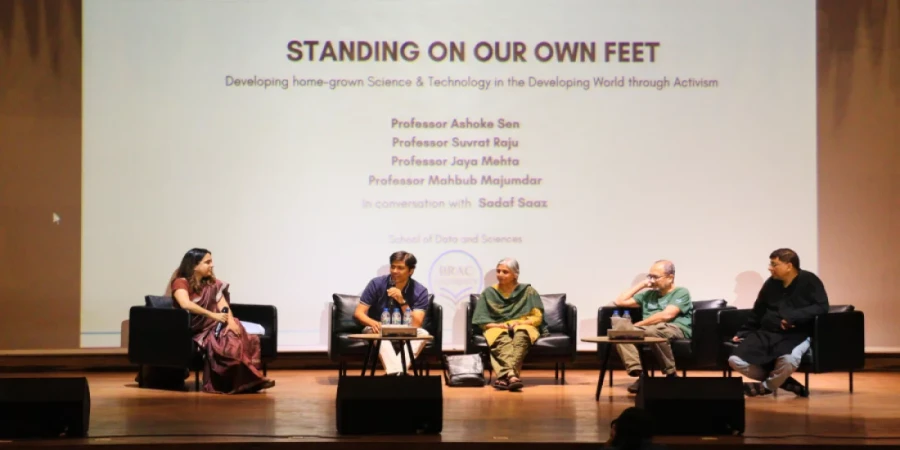
ছবি: Photo: Collected
BRAC University’s School of Data and Sciences has launched a discussion series titled “The NOW Talk.” The inaugural session of the series, titled “Standing on Our Own Feet: Developing Homegrown Science and Technology in the Developing World Through Activism,” was held on Monday (February 3) at the university’s Merul Badda campus.
The discussion featured renowned scientists and experts who deliberated on the challenges and possibilities of fostering a world-class scientific environment in developing nations.
The panel included Professor Ashoke Sen, a prominent theoretical physicist, a leading expert in string theory, and a Breakthrough Prize winner in Fundamental Physics; Professor Subroto Raju, a scientist known for his research on the quantum structure of black holes and a recipient of the Nishina Asia Award; Professor Jaya Mehta, a senior economist at the Joshi Adhikari Institute of Social Studies in Delhi and an expert in agricultural economics and sustainable development; and Professor Mahbubul Alam Mazumdar, the Dean of BRAC University’s School of Data and Sciences. The discussion was moderated by Sadaf Saje, a member of BRAC University’s Board of Trustees.
During the event, the speakers stressed the importance of achieving scientific excellence in developing countries. They discussed strategies for overcoming structural challenges while ensuring that technological advancements do not come at the expense of labor rights.
Professor Ashoke Sen noted that significant scientific progress can be achieved even with limited resources through dedication and intellectual perseverance. Professor Jaya Mehta highlighted the need to integrate economic progress with social activism, stating that such an approach accelerates inclusive development and ensures equal opportunities for all.
Professor Subroto Raju emphasized the importance of building strong institutions to prevent the brain drain of talented individuals from developing nations. He also discussed the necessity of increasing investments in research to enable scientists to contribute to their own countries rather than seeking opportunities abroad.
Professor Mahbubul Alam Mazumdar underscored the need to strengthen the foundation of fundamental science education. He emphasized the importance of generating indigenous knowledge to address local challenges. Citing examples of Grameen Bank and BRAC, he explained how local initiatives could provide solutions to global issues.
He further stated that the youth of Bangladesh have immense potential and advised harnessing their talents effectively. He also stressed the importance of establishing robust institutions in the country to ensure that talented students contribute to national development rather than seeking opportunities overseas.
repoter






